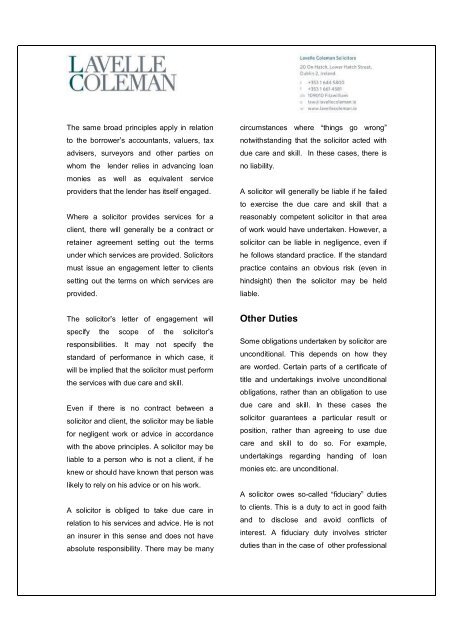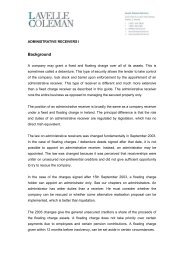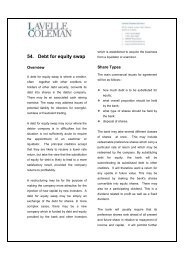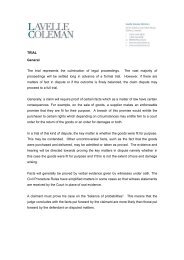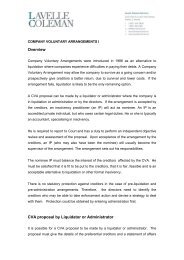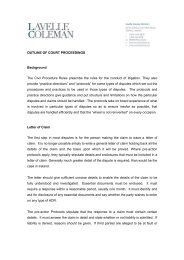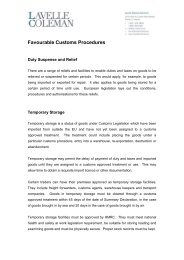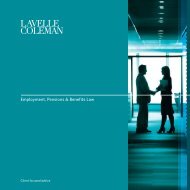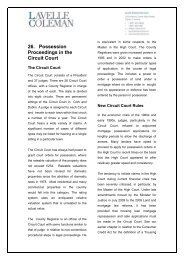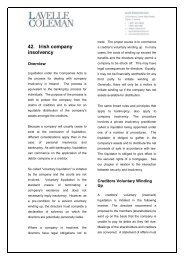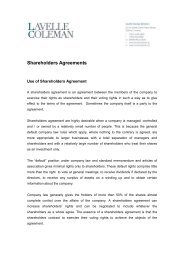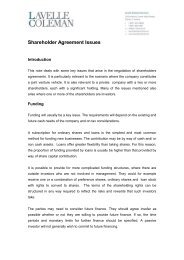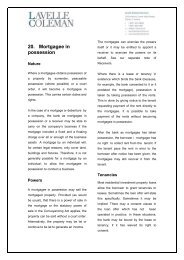45. Negligence and Breach of Duty Claims - Lavelle Coleman
45. Negligence and Breach of Duty Claims - Lavelle Coleman
45. Negligence and Breach of Duty Claims - Lavelle Coleman
You also want an ePaper? Increase the reach of your titles
YUMPU automatically turns print PDFs into web optimized ePapers that Google loves.
The same broad principles apply in relation<br />
to the borrowers accountants, valuers, tax<br />
advisers, surveyors <strong>and</strong> other parties on<br />
whom the lender relies in advancing loan<br />
monies as well as equivalent service<br />
providers that the lender has itself engaged.<br />
Where a solicitor provides services for a<br />
client, there will generally be a contract or<br />
retainer agreement setting out the terms<br />
under which services are provided. Solicitors<br />
must issue an engagement letter to clients<br />
setting out the terms on which services are<br />
provided.<br />
circumstances where things go wrong<br />
notwithst<strong>and</strong>ing that the solicitor acted with<br />
due care <strong>and</strong> skill. In these cases, there is<br />
no liability.<br />
A solicitor will generally be liable if he failed<br />
to exercise the due care <strong>and</strong> skill that a<br />
reasonably competent solicitor in that area<br />
<strong>of</strong> work would have undertaken. However, a<br />
solicitor can be liable in negligence, even if<br />
he follows st<strong>and</strong>ard practice. If the st<strong>and</strong>ard<br />
practice contains an obvious risk (even in<br />
hindsight) then the solicitor may be held<br />
liable.<br />
The solicitors letter <strong>of</strong> engagement will<br />
specify the scope <strong>of</strong> the solicitors<br />
responsibilities. It may not specify the<br />
st<strong>and</strong>ard <strong>of</strong> performance in which case, it<br />
will be implied that the solicitor must perform<br />
the services with due care <strong>and</strong> skill.<br />
Even if there is no contract between a<br />
solicitor <strong>and</strong> client, the solicitor may be liable<br />
for negligent work or advice in accordance<br />
with the above principles. A solicitor may be<br />
liable to a person who is not a client, if he<br />
knew or should have known that person was<br />
likely to rely on his advice or on his work.<br />
A solicitor is obliged to take due care in<br />
relation to his services <strong>and</strong> advice. He is not<br />
an insurer in this sense <strong>and</strong> does not have<br />
absolute responsibility. There may be many<br />
Other Duties<br />
Some obligations undertaken by solicitor are<br />
unconditional. This depends on how they<br />
are worded. Certain parts <strong>of</strong> a certificate <strong>of</strong><br />
title <strong>and</strong> undertakings involve unconditional<br />
obligations, rather than an obligation to use<br />
due care <strong>and</strong> skill. In these cases the<br />
solicitor guarantees a particular result or<br />
position, rather than agreeing to use due<br />
care <strong>and</strong> skill to do so. For example,<br />
undertakings regarding h<strong>and</strong>ing <strong>of</strong> loan<br />
monies etc. are unconditional.<br />
A solicitor owes so-called fiduciary duties<br />
to clients. This is a duty to act in good faith<br />
<strong>and</strong> to disclose <strong>and</strong> avoid conflicts <strong>of</strong><br />
interest. A fiduciary duty involves stricter<br />
duties than in the case <strong>of</strong> other pr<strong>of</strong>essional


